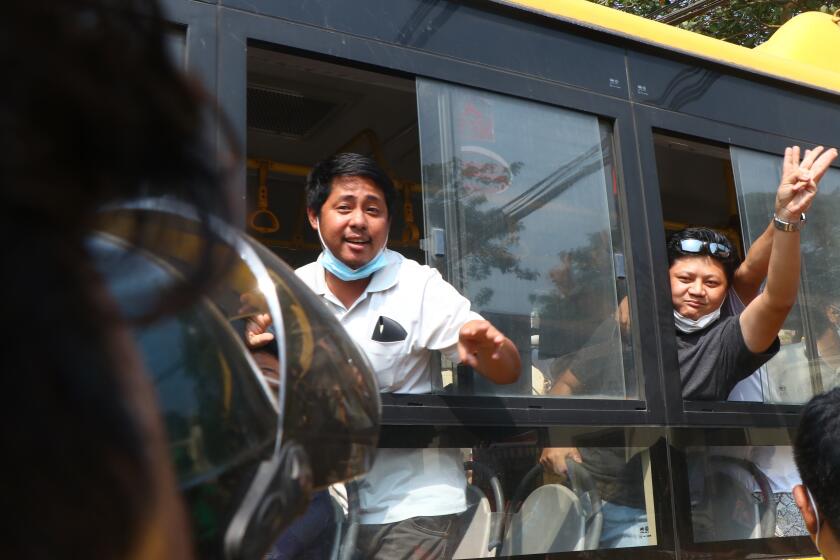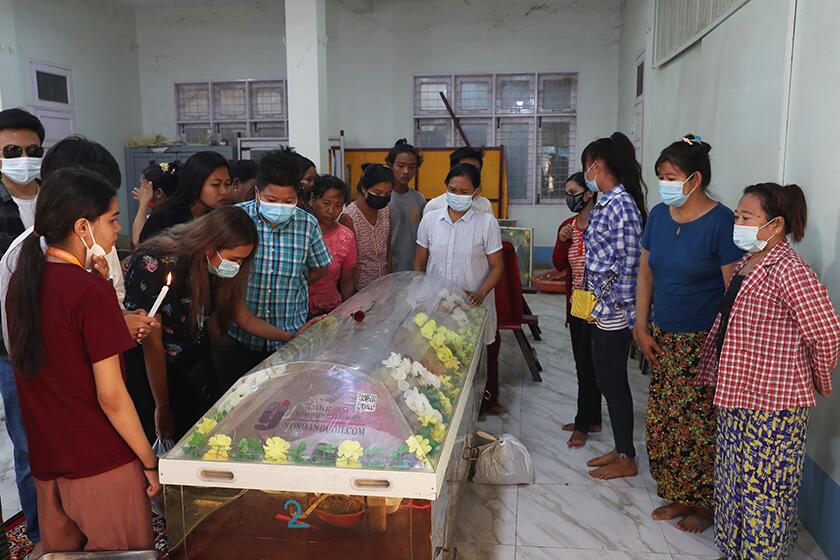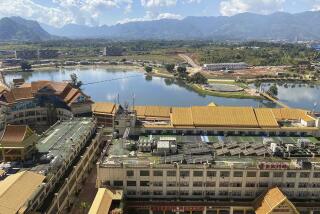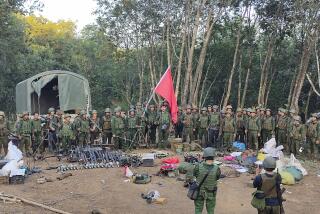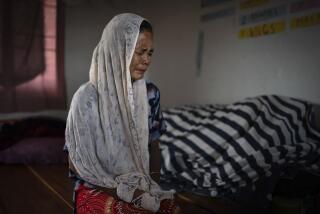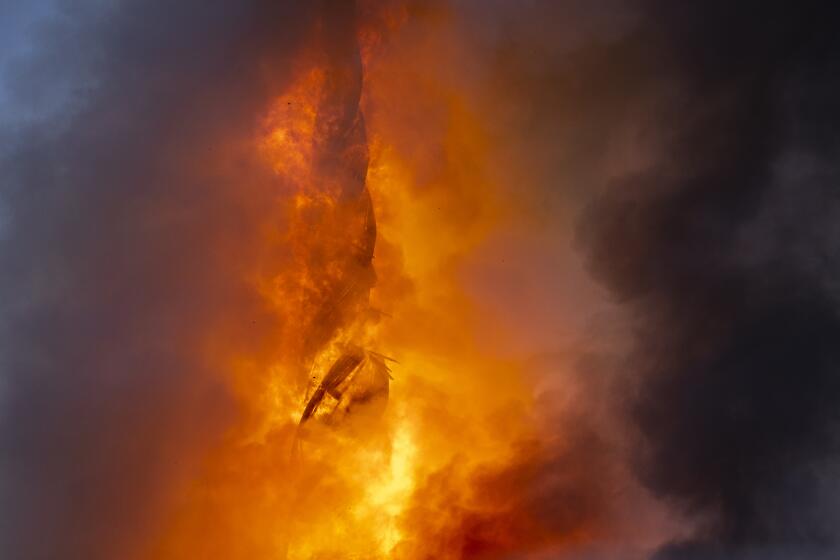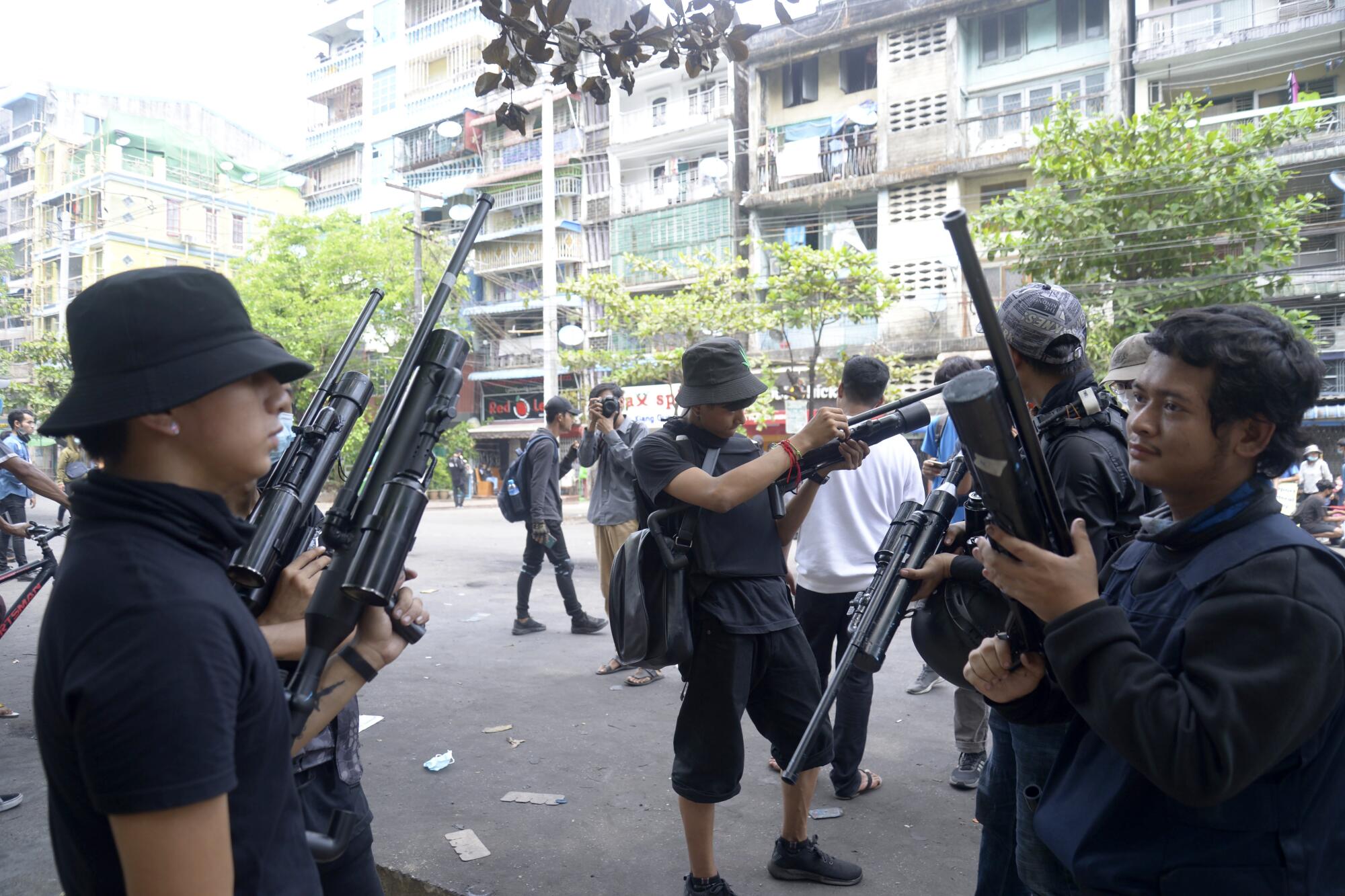
The 26-year-old student has never touched a gun, but she is heading into the jungles to enlist with rebels seeking to overthrow the military junta in a nation tumbling toward civil war.
The student, who lives in Yangon, Myanmar’s largest city, will soon embark on a treacherous journey snaking past military checkpoints close to the border with Thailand. Her hope of studying in Europe has been set aside so she can train in guerrilla warfare alongside ethnic insurgents, including her fellow majority Buddhist Bamars, who are determined to resist Myanmar’s military junta, which seized power in a February coup.
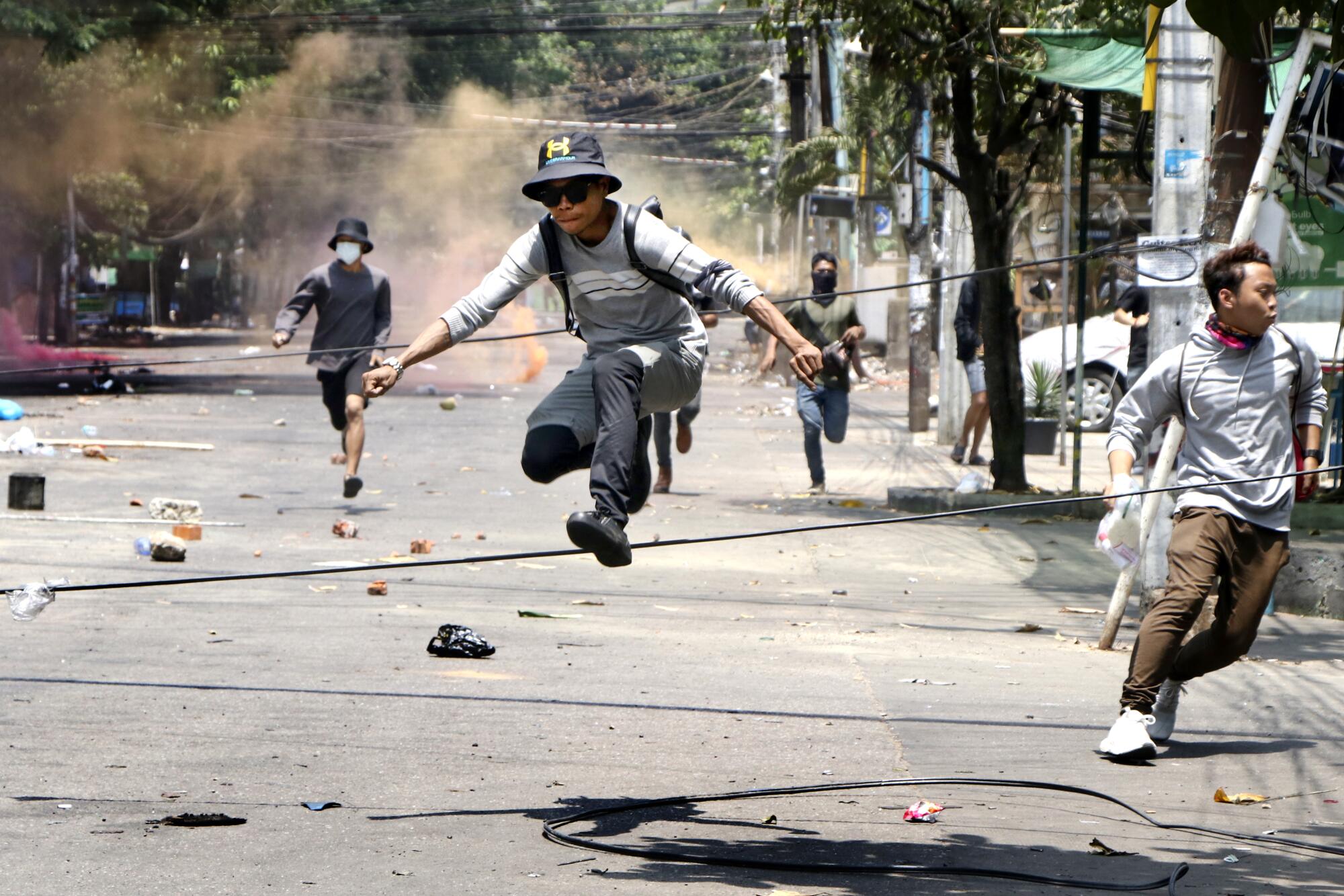
“I want to eliminate the military and its rule,” the slightly built woman said, declining to disclose her name to avoid arrest. “I’m not scared to fight. I’m prepared to die.”
For more than 70 years, insurgencies have flared across Myanmar, a country whose ideals of nationhood remain fractured by ethnic divisions deepened by more than a century of British colonial rule followed by decades of military dictatorship. But never have those conflicts threatened to inflame this country of 54 million like they do now.
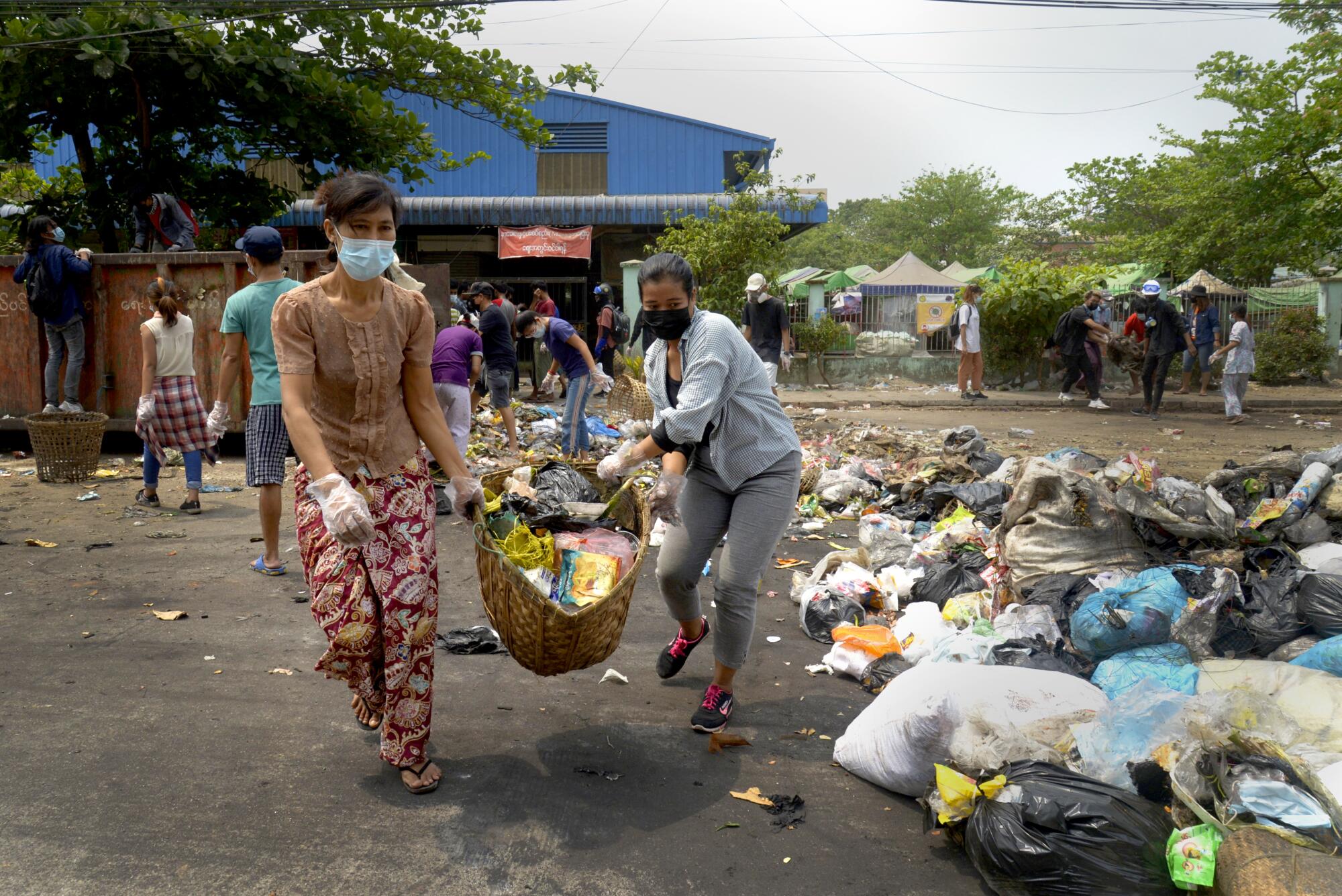
The overthrow of the democratically elected civilian government Feb. 1 and the subsequent crackdown by security forces on protesters has united ethnic groups. Families are burying their dead — more than 600 have been killed — and the fury against the generals rises daily.
Chin villagers in the western reaches of the country near India are now fashioning homemade bombs and attacking security forces. Karen rebels to the east are welcoming calls by the deposed civilian government to establish a federal army to confront the military. And Bamar demonstrators and activists in the largest urban centers are abandoning the idea of peaceful protest in favor of armed resistance.
Myanmar, also known as Burma, is barreling closer toward what United Nations special envoy Christine Schraner Burgener described as “civil war at an unprecedented scale,” adding that a “bloodbath” was imminent.
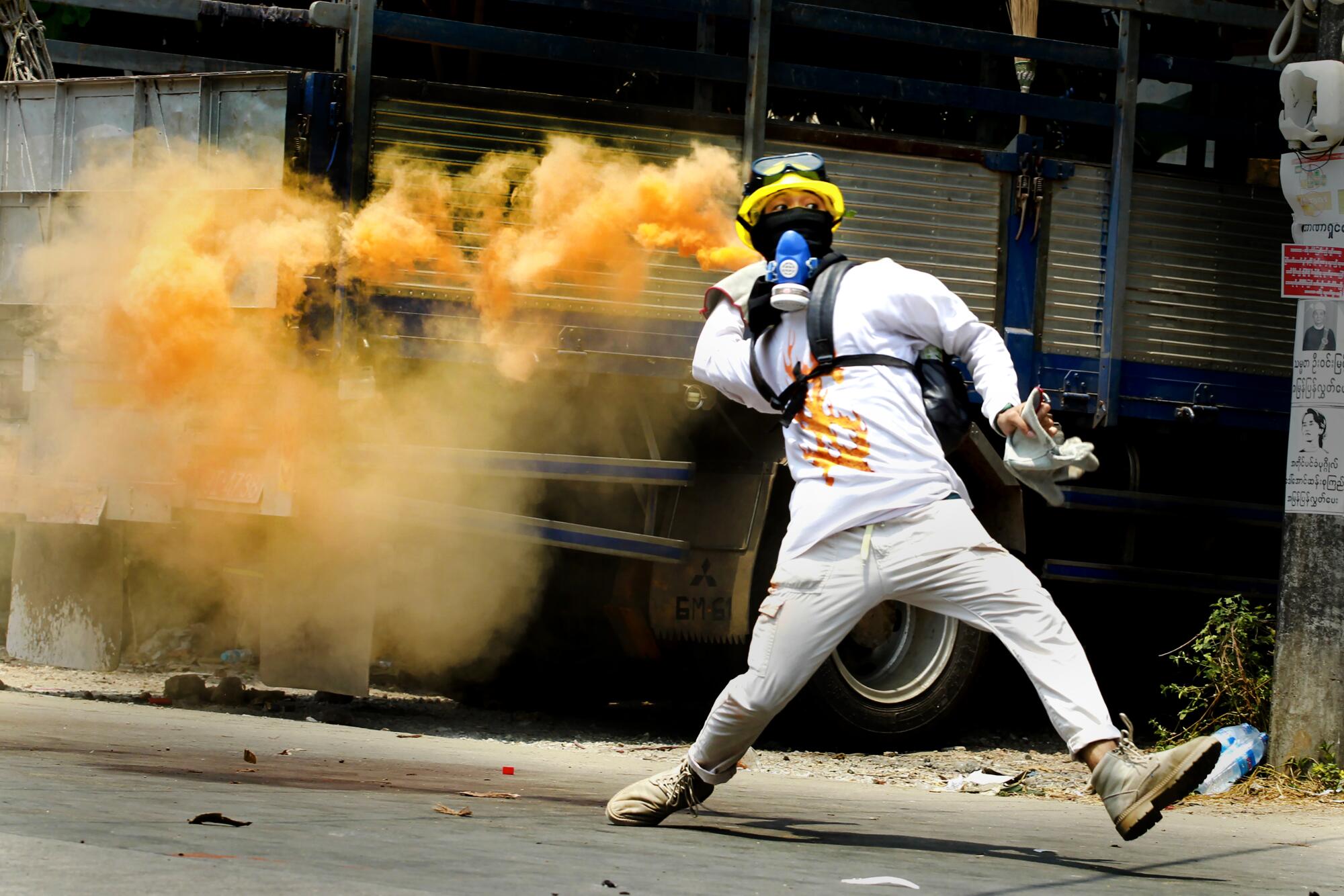
Aid workers are bracing for a crush of refugees in the coming weeks. The economy is cratering. Internet access has been cut or limited for millions. Humanitarian groups on the Thai border say greater numbers of people are fleeing a country teetering on collapse.
The international community fears the conflict could escalate into a volatile diplomatic standoff in a part of the world contested by major powers such as China, India, Russia and the U.S. The legitimacy of the Assn. of Southeast Asian Nations, a union of regional states that includes Singapore, Thailand, Indonesia, Malaysia and Myanmar, may rest on its efforts to persuade the junta to back down.
The Biden administration on Thursday imposed stiff sanctions on Myanmar’s multibillion-dollar gemstone industry, one of the country’s main sources of income: “We are sending a clear signal to the military that the United States will keep increasing pressure on the regime’s revenue streams until it ceases its violence, releases all those unjustly detained, lifts martial law ... and restores Burma to the path of democracy,” Secretary of State Antony J. Blinken said.
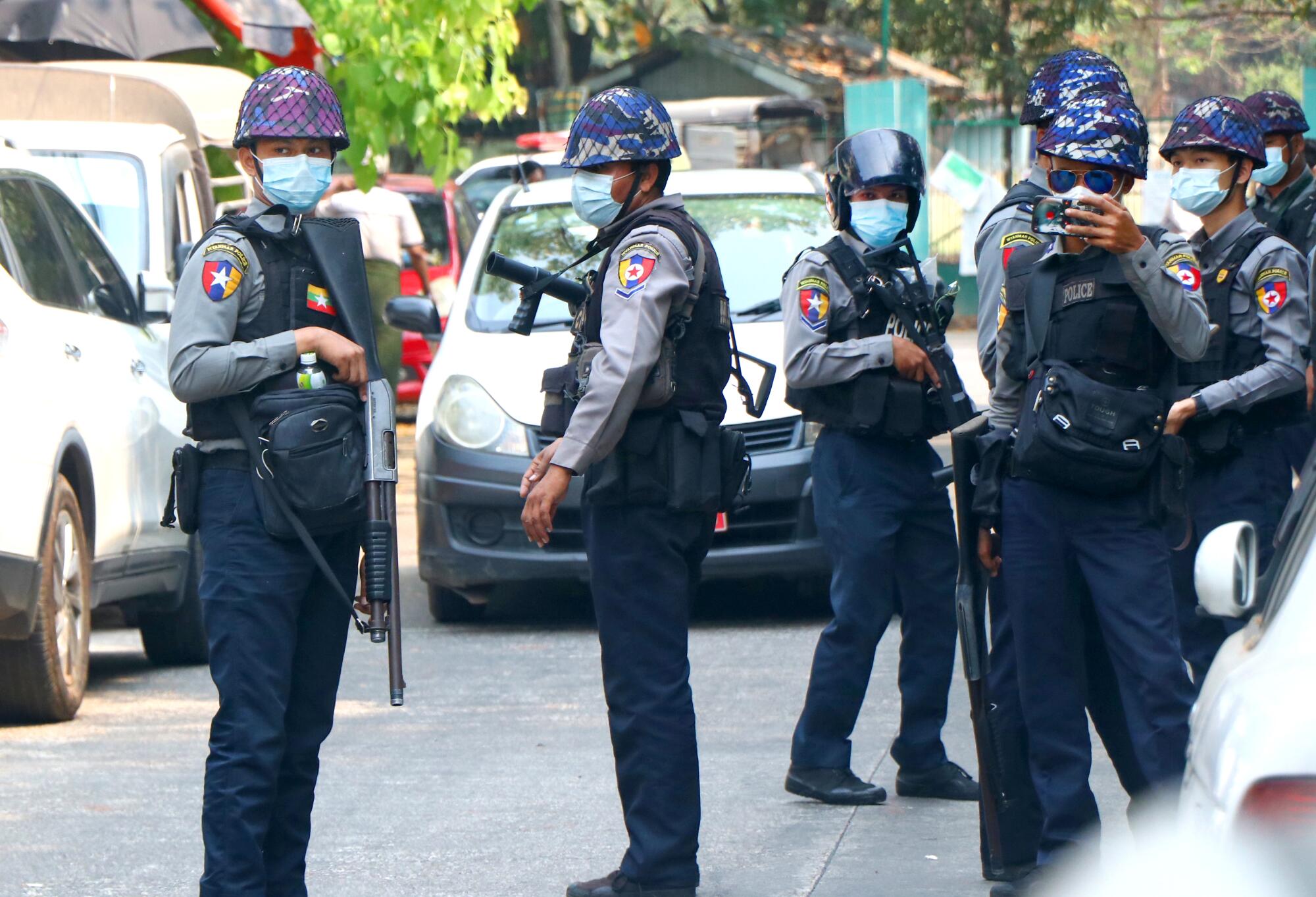
But the military, known as the Tatmadaw, has given no indication it will refrain from brute force in a crisis that could leave it ruling over a wasteland of devastated cities and ruined villages.
Security forces’ victims include dozens of children, and they have terrorized swaths of the population in nighttime raids. They’ve burned protesters alive, beaten others to death and tortured prisoners by scorching off tattoos of popular civilian leader Aung San Suu Kyi, now jailed.
Protesters say labor strikes and civil disobedience are the only ways to dislodge the military dictatorship in Myanmar. It may mean pushing millions into poverty.
In Kalay, a city bordering Myanmar’s northwestern Chin state, security forces reportedly killed a dozen people Wednesday morning after firing machine guns and rocket-propelled grenades at barricades built by protesters. Cellphone video from the scene showed survivors with extensive wounds. Townspeople battled soldiers with hunting rifles.
North of Kalay in the Chin stronghold of Tamu, four soldiers were killed by civilians over the weekend. The attack was in response to a violent crackdown by security forces last month.
A 40-year-old resident of the city who spoke on condition of anonymity said civilians lobbed homemade bombs to attack soldiers. He said the army sent in reinforcements, who sprayed civilian positions with more than 1,000 rounds of ammunition. Anti-coup protesters have since melted away and regrouped to organize more attacks, he said.
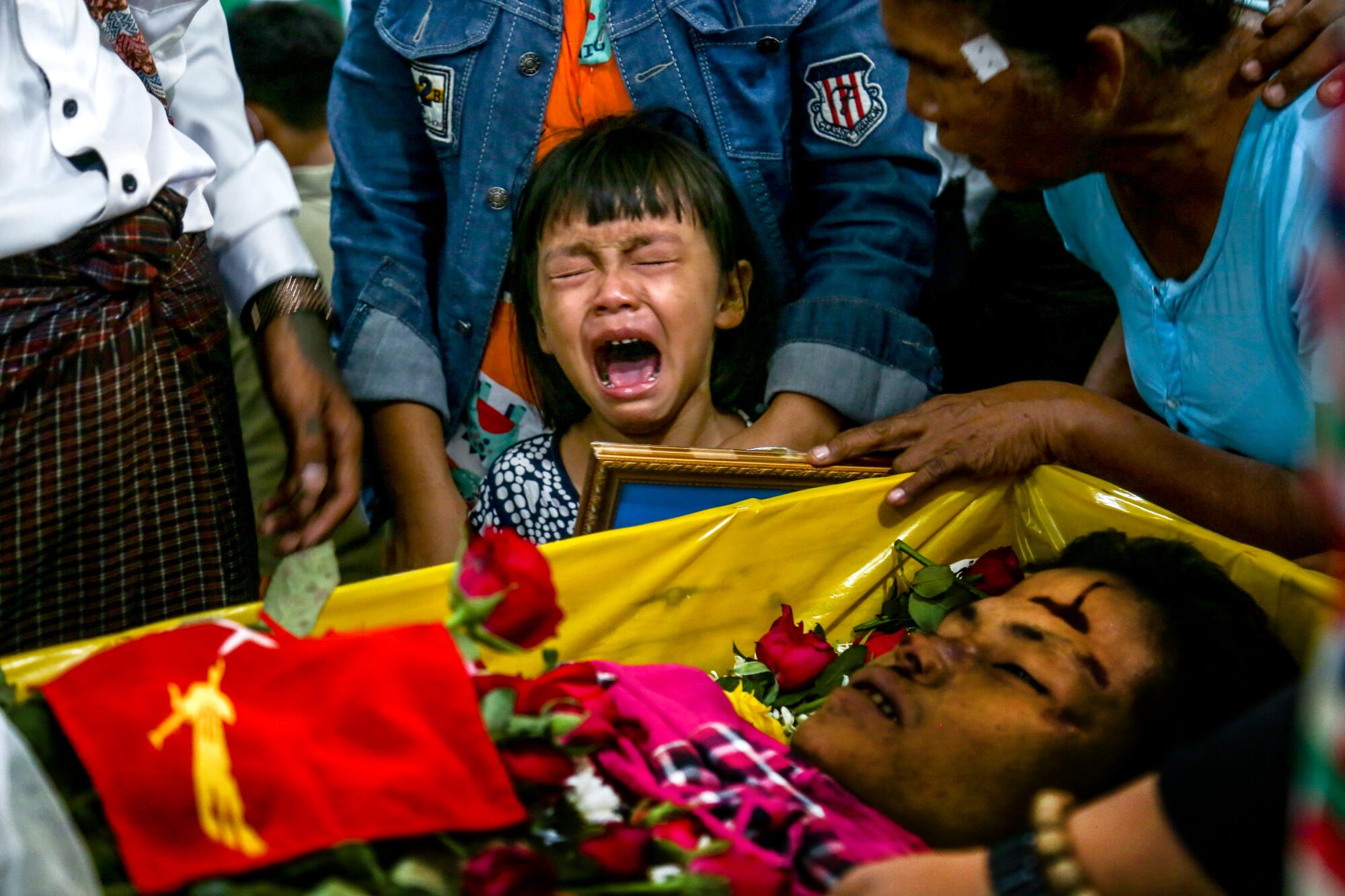
“More citizens will rise up to fight the Tatmadaw,” he said, adding that residents of Tamu have been circumventing daily internet blackouts imposed by the junta by using SIM cards purchased in nearby India.
“People can still use Facebook and see the brutality of security forces,” he said. “This is uniting ethnic groups.”
That is no small detail in Myanmar, where generations have grown up with armed conflict, not just with the Tatmadaw but among ethnic minority groups.
About 68% of Myanmar’s population are Bamar, who live in the large urban areas of the Irrawaddy River Valley. Bamars have dominated military and political life in Myanmar since national independence in 1948.
Tension abounds over how the Bamar share power and national identity with the remaining major ethnic groups such as the Shan, Karen, Rakhine, Kachin and Chin. Other groups such as the Muslim Rohingya have been rejected — made stateless and driven out by the hundreds of thousands to refugee camps in Bangladesh in “clearance operations” led by the Tatmadaw.
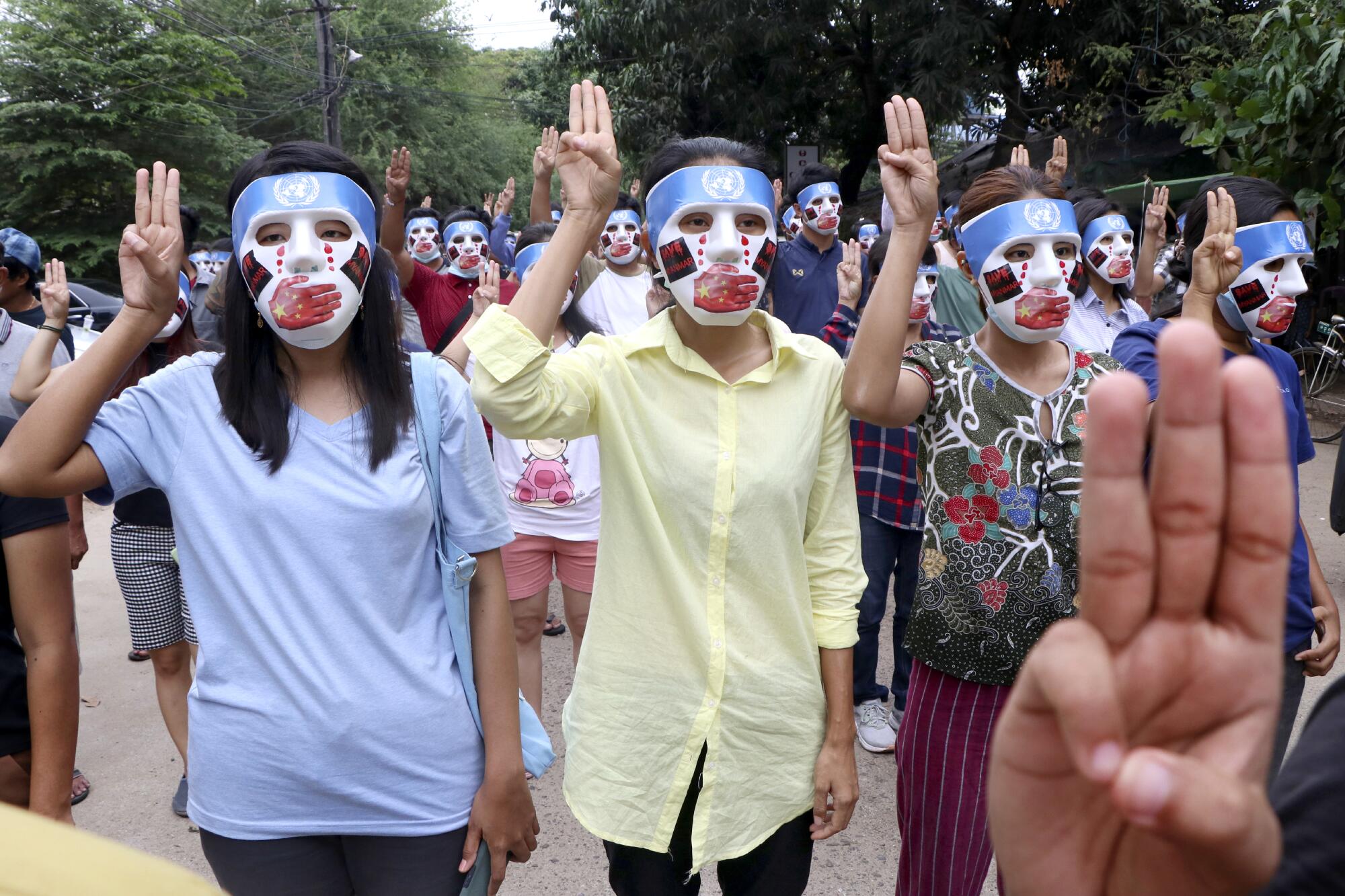
One of the signature efforts of Myanmar’s decade of democratic reforms prior to the coup was the civilian government-led peace process aimed at ending years of civil war in the borderlands.
While the initiative led to a national cease-fire agreement with some groups, the process eventually stalled. Ethnic communities continued to view Suu Kyi and her ruling National League for Democracy party as a defender of Bamar interests, highlighted by their indifference to the Tatmadaw’s treatment of the Rohingya.
The coup has changed that calculus. The Committee Representing Pyidaungsu Hluttaw, a group of deposed NLD lawmakers claiming to be the legitimate government of Myanmar, has declared the country’s military-backed constitution void and drawn up an interim charter in its place.
The group’s constitution aims to draw support from the ethnic regions by recognizing calls for greater autonomy and the formation of a federal army under the control of civilian leaders.
“The proposal to form a federal army can be considered a declaration of war against the Tatmadaw,” said a Bamar Foreign Ministry official who supports the new charter and spoke privately to prevent security forces from targeting family members. “Whether that leads anywhere or not, this is a big change in direction from the peaceful protests.
“There are a lot of ethnic armed organizations and most of them fight each other as much as the Tatmadaw,” the official continued. “The Tatmadaw is much bigger than all of them combined. There are elements in the Tatmadaw that might turn on the coup leaders, but in a chaotic civil war scenario, I worry these field commanders might choose to become independent warlords.”
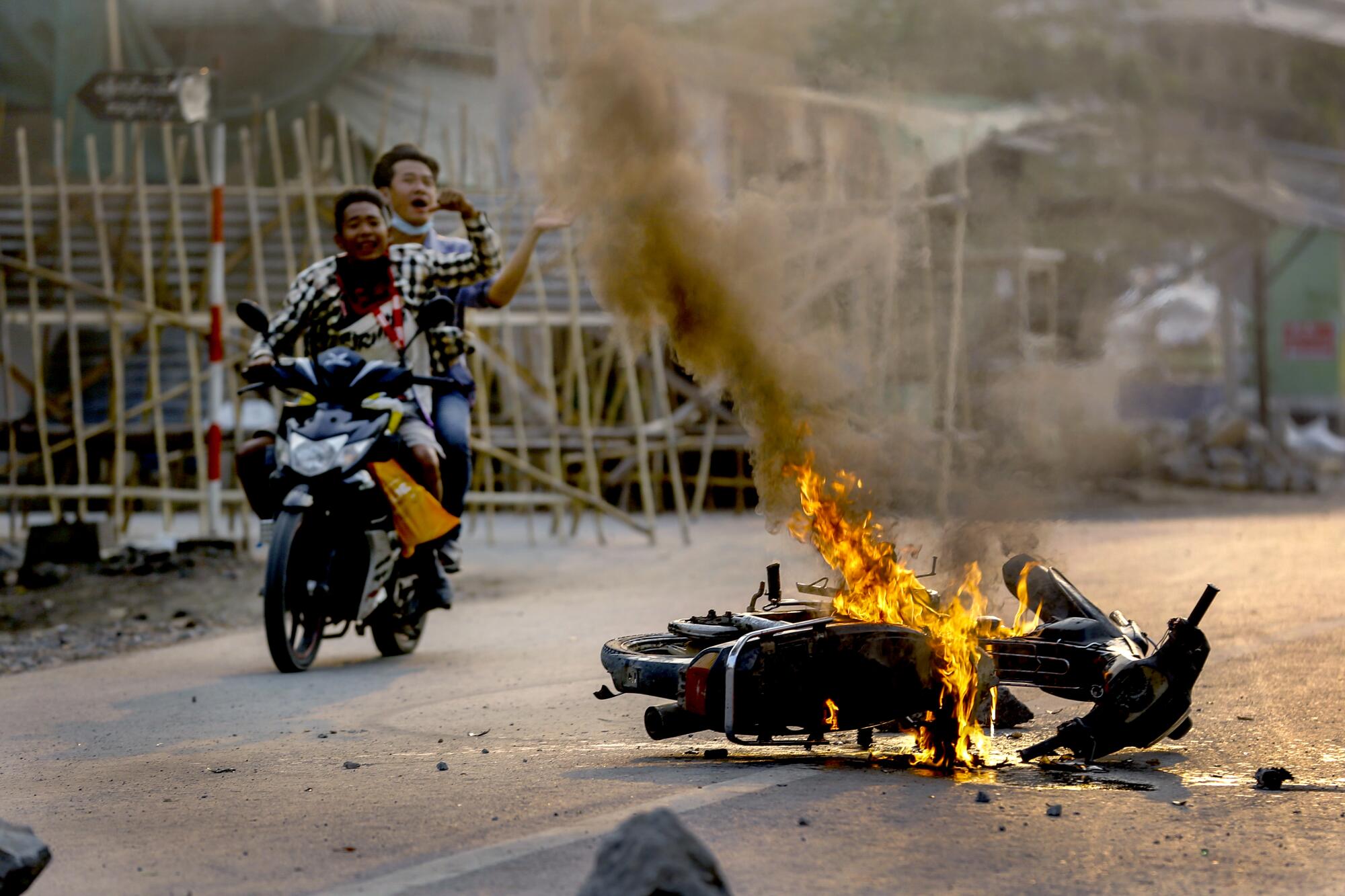
The addition of ethnic armed groups to the conflict could complicate the Tatmadaw’s bid to consolidate power. But analysts say it’s unlikely that enough of the more than 20 rebel organizations will join together and mount a serious threat to the junta’s survival.
The Tatmadaw is a relatively modern army with an estimated 100,000 combat-ready troops supplied with arms from Russia, China, India, North Korea and Israel, according to the U.N. The rebels, by comparison, are mostly lightly armed and trained to either defend territory or menace security forces with small raids.
Kyal Sin wore a T-shirt that said ‘Everything will be OK’ when she was shot by Myanmar security forces on the deadliest day since the military coup.
The one insurgent group that could threaten the Tatmadaw, the 25,000-member United Wa State Army, has close ties to China and hasn’t opposed the coup.
“None of the ethnic armed groups has the numbers or firepower to carry the fight to the army in ethnic Bamar regions of central Myanmar,” said Anthony Davis, a Bangkok-based security analyst. “But within or close to their own areas of operations, several groups could conduct hard-hitting guerrilla operations that, even if only loosely coordinated, would pose serious distractions for the Tatmadaw and tie down large numbers of troops.”
Padoh Saw Taw Nee, head of foreign affairs for the Karen National Union, which has fought one of the world’s longest-running rebellions in eastern Myanmar, said he welcomes the formation of a federal army, but only after ethnic groups are granted greater self-determination.
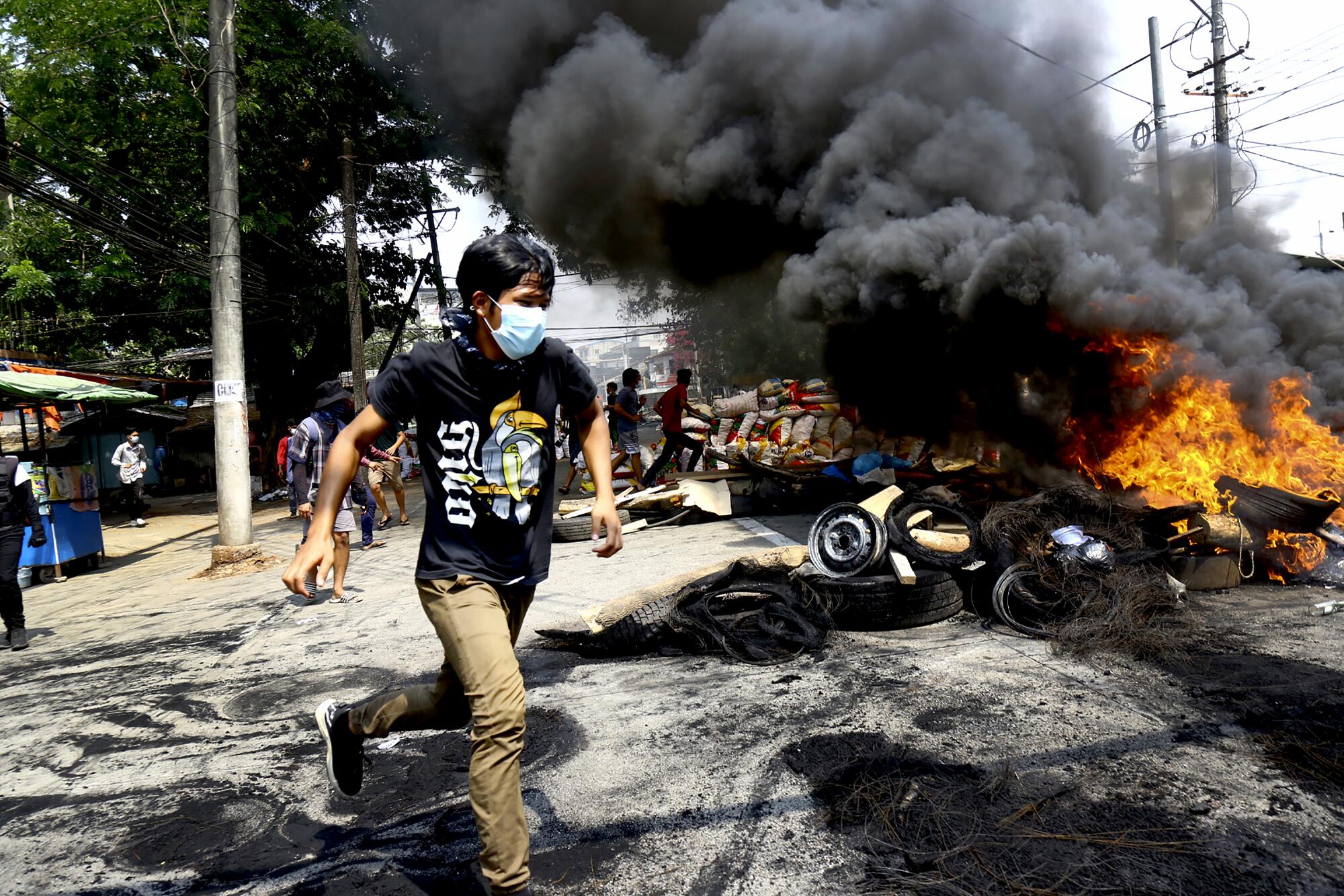
“We have to build trust to collaborate,” he said, adding that the Bamar have “only seen us as bad people for over 70 years.”
Padoh Saw Taw Nee said the KNU and its armed wing, the Karen National Liberation Army, have given refuge to increasing numbers of Bamar citizens on the run from security forces, including civil servants, doctors and even police. He said many are seeking training to resist the Tatmadaw, not just in the jungle highlands but back in the cities.
“The most important thing now is uprooting the military dictatorship,” he said.
The arrival of the outsiders comes amid renewed fighting in Karen territory with the Tatmadaw mounting airstrikes for the first time in 20 years in retaliation for the seizure of an army base and the death of 10 officers at the hands of insurgents.
At least 14 Karen villagers have been killed and 40 wounded, according to the Free Burma Rangers, a humanitarian group founded by David Eubank, a Christian missionary and former U.S. Army Special Forces member.
More than 20,000 villagers have been forced to flee into the jungle, hiding in mountain redoubts where food is growing scarce. Military aircraft and the threat of artillery fire is keeping people from their rice fields, raising the risk they won’t plant their crops on time.
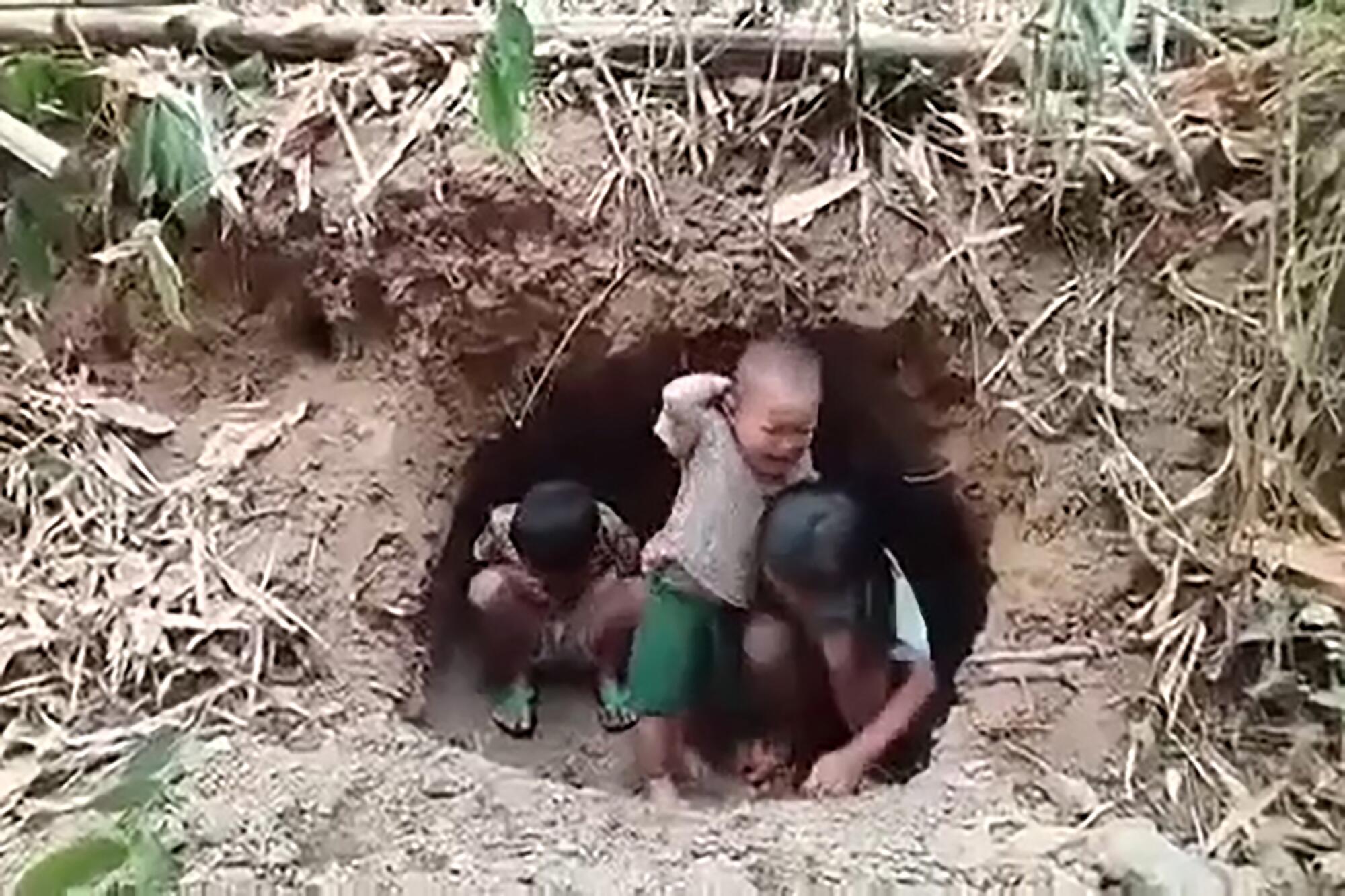
Eubank, who is embedded with the rebels, said the influx of Bamar volunteers has lifted morale. Those who can’t fight are planning to help in other ways such as political advocacy, building logistics or opening schools.
Despite being outnumbered and outgunned, Eubank said the insurgents have an advantage in their knowledge of the jungle and their zeal to fight compared with the typical Tatmadaw foot soldier, who is often underfed and poorly treated by his superiors.
“The Burmese military lacks an ideology,” Eubank said. “They’re not like Isis, the Nazis or the Japanese Imperial Army. They’re a big mafia. That makes it very hard for units to sustain [combat] action. No one is going to willingly die for a lie.”
Times staff writer Pierson reported from Singapore and special correspondent Kyaw Hsan Hlaing from Yangon. Times staff writer Tracy Wilkinson in Washington contributed to this report.
More to Read
Start your day right
Sign up for Essential California for news, features and recommendations from the L.A. Times and beyond in your inbox six days a week.
You may occasionally receive promotional content from the Los Angeles Times.
